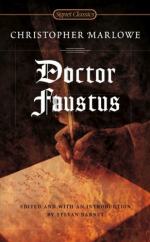|
This section contains 5,103 words (approx. 18 pages at 300 words per page) |

|
SOURCE: "Marlowe: The Arts of Illusion," in The Yale Review, Vol. LXI, No. 4, June, 1972, pp. 530-543.
In the following essay, Giamatti reads Doctor Faustus as an examination of the Renaissance conviction that human beings could "remake or change or transform" themselves, and as an exporation of the question of whether this would tend to be done good or for evil purposes.
George Sabellicus was pleased to call himself, a contemporary tells us in 1507, "the younger Faust, the chief of necromancers, astrologer, the second magus, palmist, diviner with water and fire, second in the art of divination by water." But even this billing did not smooth the way, for Dr. Faust, as Sabellicus came to be called, was constantly forced to move on. City after city, nervously or defiantly, expelled him. It had always been so for the man called to the arts of illusion.
From antiquity through the...
|
This section contains 5,103 words (approx. 18 pages at 300 words per page) |

|


